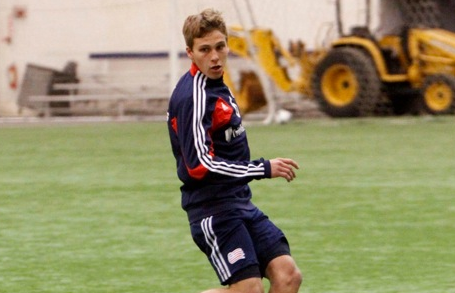Caldwell Getting Re-acclimated
- Updated: February 12, 2013

Homegrown Player Scott Caldwell is already learning the ropes in MLS this winter. (Photo: Chris Aduama/aduama.com)
Scott Caldwell may know his way around Foxboro better than most of his fellow rookies, but that doesn’t mean that he’s got a step on them this preseason.
Granted, the the 21-year-old midfielder spent the past four summers training with the Revolution, keeping him eligible for Homegrown Player status. As one of the first captains of the club’s U-18 squad, Caldwell had no problem finding his way to the locker room even before he signed his first professional contract in December.
Even so, Caldwell, who recently completed his collegiate career at Akron, is the first to admit that he’s in a whole new world as a first-team player this winter.
“It’s obviously different than what I’ve experienced with the team in the past, just coming in and training a little bit,” Caldwell said. “It’s not something I’m used to in length for a preseason camp, but it’s definitely great to get in with the team and get to know guys better.”
While there’s sure to be plenty of opportunities to get to know his teammates better this winter, Caldwell knows that one of the first things he’ll have to do is get acclimated to the speed of MLS. And fast.
At 5-8, 150lbs., Caldwell is the first to admit he doesn’t have the most imposing frame. So to compensate, he’s be focused on out-smarting his opponent rather than out-muscling him.
“I don’t want involved too much in that,” Caldwell said. “So I just have to play quick, get the ball as much as possible and build on everything, really.”
One thing that’s worked in his favor is his cerebral approach to the game, something that head coach Jay Heaps is quick to point out.
“He’s one of the smartest players I’ve seen,” Heaps said. “He just reads the game really well. A lot has been said about ‘Is he big enough, is he strong enough?’
“But, the way he plays, he’s just so smart, he gets into passing lanes and reads it well. He’s been a tough guy to keep off the pitch.”
In another example of how the Braintree, Mass. native is different than your average rookie, he’s quick to point out that he doesn’t limit himself to seeking the advice of only a few players.
“All of them have (helped me), to be honest,” Caldwell said. “They’re all great guys and they’ve each helped me in different ways move along and keep going on this learning curve.”
Another thing that’s sure to help his cause: the amount of midfield depth the Revolution currently boast. Instead of feeling the pressure to contribute immediately, he knows he’ll be able to gradually navigate that learning curve.
But, that doesn’t mean he’s planning on taking it easy during his first professional preseason camp. Quite the opposite.
“Obviously, I want to play – everyone wants to play,” Caldwell said. “I just want to help the team win, really, in whatever ways I can and do well enough to be asked upon when needed and to play.”
Although it’s hard to say when he’ll see his first MLS minutes, Caldwell acknowledges that it’s “pretty cool” that he’s a member of the same team he once rooted for as a child.
“It’s really a great feeling,” Caldwell said. “You grow up watching these guys, and now you get to actually wear the uniform.”




3 Comments